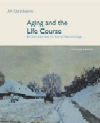1. How did demographic change create a new phase of the life course
called middle age?
Changing demographic trends have altered the nature of the life course for each
new cohort. Until recently middle age did not exist as a separate phase of the
life course. It was created by declining fertility and rising life expectancy,
which provided a married couple 20 or more years alone together after their
children had left home. 2. Do people attempt to time the major events in their lives?
The timing of life course transitions is regulated by age norms, which define
age-appropriate roles and behavior. Research shows that people have clear expectations
about the timing of various life course events and know when they are "on-time"
or "off-time." However, recent studies suggest that the term "age
timetable" may be more appropriate than "age norm," since there
are few negative sanctions attached to being off-time for life course transitions. 3. Can the sequencing of major life events create role conflict?
The concept of sequencing presumes that transitions should be made in
a particular order. Some life events are clearly sequenced, such as parenting
and grandparenting, while others overlap. Overlapping events can create role
conflict. The idea of a midlife squeeze caused by role conflicts stemming from
role overlap has received much attention. Yet only a relatively small percentage of middle-aged adults actually have
all children under 18, paid employment, and responsibilities for an aging parent
simultaneously. 4. Can major historical events affect the life course of a whole generation?
Although there is insufficient longitudinal data to test all the ideas researchers
have about the long-term consequences of early life experiences, some research
has been able to overcome these limitations. Studies show that the impact of
early experiences such as living through an economic depression can influence
the life course of an entire generation. However, the consequences vary depending
on the individual's age at the time the event occurred and on what decisions
were made about how to deal with that event. 5. How can government policy affect the life course?
When government policies give people at specific ages particular rights, responsibilities,
and public benefits, such as Social Security, then it has helped to standardize
the life course. Currently, there are three clearly demarcated stages in the
life course-education, work, and leisure. As society and the economy grow more
complex, the challenge now is to explore ways policies can be restructured to
allow more flexibility over the life course. | 


 2002 McGraw-Hill Higher Education
2002 McGraw-Hill Higher Education